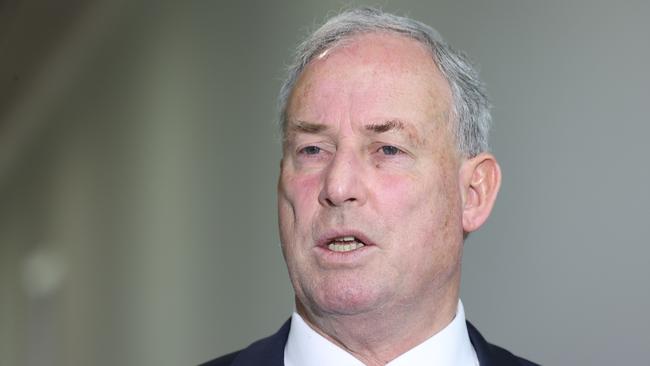Aged care reforms risk defining part pensioners as ‘wealthy’, says Richard Colbeck
Former aged-care minister Richard Colbeck has urged caution from the Coalition before accepting Labor’s aged-care bill, saying proposed increases to co-contributions for ‘wealthy’ elderly Australians risk unfairly hitting part-pensioners.

You can now listen to The Australian's articles. Give us your feedback.
Former aged-care minister Richard Colbeck has urged caution from the Coalition before accepting Labor’s aged-care bill, saying proposed increases to co-contributions for “wealthy” elderly Australians risk unfairly hitting part-pensioners.
The intervention comes as the opposition considers the 500-page aged-care bill, which it was given by the government last week after raising alarm over the lack of transparency and a need to see the full legislation before giving its support.
Shadow cabinet discussed the bill late on Monday, with concerns remaining over several instruments and “rules” to help enforce the changes which are referred to in the bill but have not yet been seen by the opposition.
Labor’s aged-care bill seeks to implement recommendations from its Aged Care Taskforce, including that wealthier older Australians make larger co-contributions to daily living and accommodation costs in aged care.
Senator Colbeck said he was concerned about some people in aged care being considered as “wealthy” and being made to pay more. “Since the release of the Aged Care Taskforce report, the repeated mantra from the government has been ‘the wealthy will pay more for their aged care’,” he said. “The question that hasn’t been answered is, how do we define the wealthy?”
While the government has made clear its legislation will not adversely impact fully funded pensioners, changes for part pensioners and their co-contributions have not been ruled out.
Senator Colbeck, who was aged-care minister between 2020 and 2022, pointed to figures showing about half of people in aged care were pensioners, with “the clear inference being that the other 45 per cent are wealthy” and would be expected to pay more under the government’s reforms. The deception here is that according to the census, about 75 per cent of those in residential aged care are in receipt of a pension,” he said.
“So who are the (extra) 20 per cent? The answer to that question is those who receive a part pension. I’m sure those Australians who receive a part pension will be delighted to hear of their newly found status as wealthy – that is what the government is saying with its statements.”

He said while he agreed that aged care needed to be properly resourced and “that those who can afford to should make a contribution to the costs of their care and accommodation”, Labor’s definition of who was considered “wealthy” enough to pay more was of concern. “Redefining who is wealthy so they can be charged more isn’t part of the deal,” Senator Colbeck said.
The government — which has opted to increase co-contributions for aged-care residents rather than introduce a broader tax or levy – is optimistic the Coalition will support the legislation following the opposition’s two-hour partyroom meeting on Tuesday morning.
Should the bill be presented to parliament this week, the opposition is likely to call for a Senate inquiry to scrutinise the legislation further.
It follows advocacy groups warning the parliament was quickly running out of time to pass the reforms before the next election, due by May.
Aged Care Minister Anika Wells told providers and advocates last week that Labor was “very close to an agreement” with the opposition on the bill, stressing that she would not proceed without bipartisan support because “you can’t have the rules change when the government does”.
Opposition aged-care spokeswoman Anne Ruston said the Coalition remained “in good faith conversations with the government”.
“The finer details of their package (are) still to be confirmed,” she said.
“The Coalition is not stopping the government from putting the bill into parliament and we have been publicly encouraging them to do so.”








To join the conversation, please log in. Don't have an account? Register
Join the conversation, you are commenting as Logout